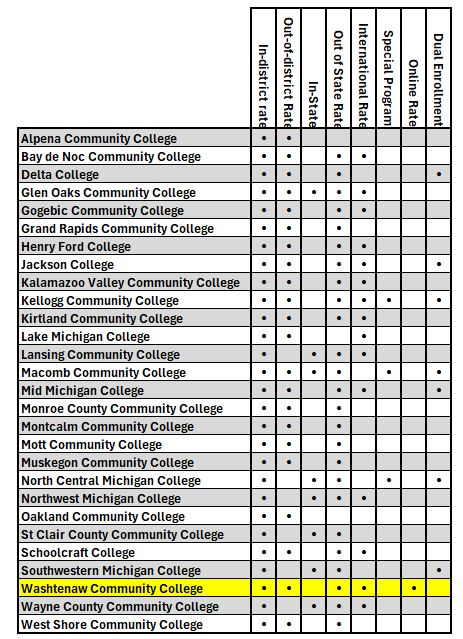An issue I frequently discuss as part of my campaign for a seat on the WCC Board of Trustees is WCC’s online tuition rate. WCC charges $99 per credit hour (plus $15 per credit hour in fees) to in-district students to take a class in the classroom at WCC. It charges $112 (plus the same $15 in fees) for the same in-district student to take the same class online.
An out-of-district student can take a class in person at WCC for $181 per credit hour (plus fees), but could opt to take the same class online for a reduced rate of $128 (plus fees). An out-of-state student can take an in-person class for $256 per credit hour but can take the same class online for $149 (plus fees). An international student can take an in-person class for $307 per hour, but can take the same class online for $149 per credit hour.
If you notice, the in-district student is the only student who pays more to take a class at WCC online. Out-of-district, out-of-state, and international students all pay less per credit hour to take a class online than they would if they sat in a classroom at WCC.
Community college district residency means something
Some people don’t see this as a problem, because the in-district student pays the lowest online tuition rate. Here’s why it’s a problem.
First, Washtenaw County residents established the Washtenaw Community College District in 1965. In doing so, they agreed to pay taxes to support the district. Part of that support reduces the cost of attendance for Washtenaw County residents. After all, they pay taxes – either directly or indirectly when they pay rent – to support WCC. In fact, Washtenaw County residents pay four different millages to support WCC. Two of these millages are permanent; the other two must be renewed periodically. Collectively, these millages generated more than $76M in 2024. We’re not talking about small bills, here.
Second, creating a district created boundaries. Those households inside the district have voluntarily increased their taxes for nearly 60 years to create, support, and expand WCC. Since 1965, Washtenaw County residents have likely invested nearly $2B into WCC. They did this to improve the quality of life for residents of Washtenaw County.
Those residents outside of the district boundaries did not raise their taxes voluntarily to support WCC. They can still use the facilities, but the subsidy that the Washtenaw County taxpayers provide to district residents is not available to them. Since the State of Michigan also supports WCC financially, an out-of-state resident can take classes at WCC, they can, but their tuition rate will not include the Washtenaw County subsidy or the State of Michigan subsidy. The out-of-state tuition rate includes a little break because WCC also receives federal funds.
If an international student wants to take a class at WCC, that student isn’t entitled to any reduction in cost. They pay the full cost of the class.
No other Michigan community college has an online tuition rate
Third – and this is important: no Michigan community college besides WCC even offers an online tuition rate. WCC’s online tuition rate is highly irregular. Tuition at every other community college is based almost entirely on where a student lives. A few community colleges have special (higher) tuition rates for certain programs like nursing, skilled trades, fire and police programs, etc. Some community colleges have a separate per-credit-hour rate for dual-enrolled students. A few community colleges grant veterans the in-district tuition rate, and some college waive tuition fully or partially for in-district senior citizens.

By and large, all community colleges have a mechanism to charge an in-district, out-of-district/in-state, out of state, and international rate. Some colleges – like Alpena – simply charge based on living in the district or outside of it.
The notion that online students who live out of the district should pay tuition based on anything other than their residency status is literally absurd. WCC’s “online tuition” model creates a subsidy for non-resident students that Washtenaw County taxpayers pay but receive absolutely benefit from.
Washtenaw County taxpayers, you are being taken advantage of.
Photo Credit: The Maritime Aquarium at Norwalk , via Flickr























